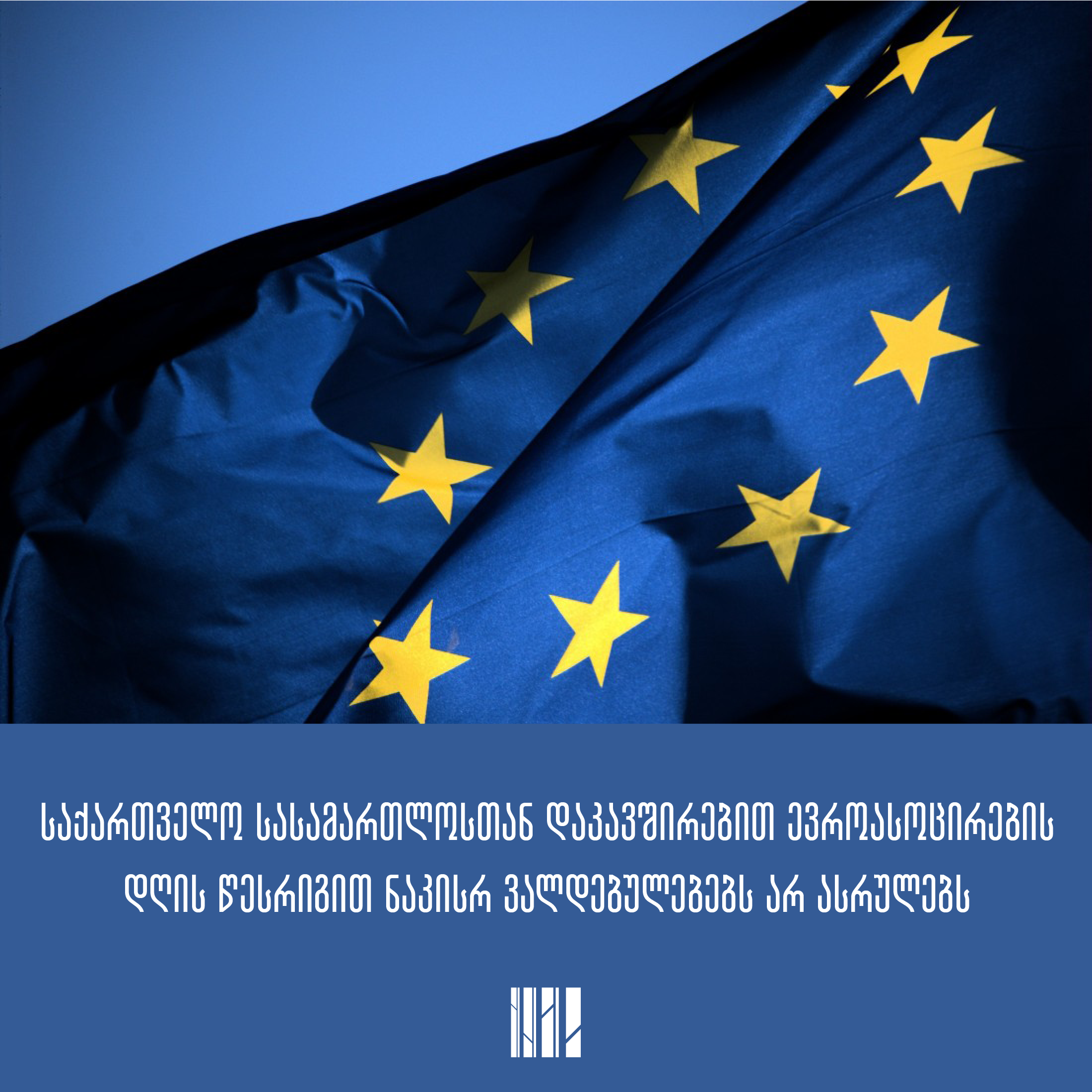საერთო ცხელი ხაზი +995 577 07 05 63


On March 3, during the numerous protests in Tbilisi, alongside Ukraine the Georgian government issued an official request of membership to the European Union.[1] However, a mere application cannot be a guarantee of success. Among the obligations under the Association Agreement, the thematic direction of the rule of law, in particular the reform of the judiciary has a vital place.
Review of the EU membership application is a complex and lengthy process, which examines the state of fulfillment of the country's international obligations and unwavering respect for the core values of the organization. Despite the statement made, the recent developments in EU-Georgia relations show that the Georgian government is not committed to its stated goals of EU membership, which is primarily reflected in the non-fulfillment of the Association Agenda adopted in 2014. The implementation of the Association Agenda is crucial for Georgia's progress in building democracy, strengthening its institutions and integrating with European structures.
The Association Agenda highlights the importance of ensuring/strengthening the principles of impartiality, efficiency, integrity, professionalism, complete independence, and accountability of judges in the reform process of the judiciary. To achieve these goals, the appropriate strategic directions were identified. Based on the requirements outlined in the EU-Georgia Association Agenda, in 2017, the High Council of Justice of Georgia approved the 2017-2021 Judicial Strategy and its Implementation Action Plan for 2017-2018. However, after 2019, the process of mandatory renewal of these documents was not undertaken.[2] While assessing the state of performance of the activities envisaged in the 2017-2021 Judicial Strategy, as for the period from 2017 to February 2020, out of 92 activities reviewed, only 35 were fulfilled (31 were partially fulfilled and 26 were unfulfilled).[3]
The most obvious example of disrespect by the Georgian government towards the values of the EU institutions and the organization was the annulment of the April 19 agreement (mediated by EU representatives and signed by main political actors to defuse the ongoing political crisis) by the ruling party. Document intended to move the process to a formal-political framework and addressed several broad issues related to the justice system reform and, as a whole, presented the prospect of a substantive rectification of the judiciary. However, the ruling party did not show the will to reform the judiciary and removed the issue of creating politically neutral institutions from the political agenda indefinitely. With the April 19 agreement, Georgia had a chance to share Western values in the process of democratization of the judiciary. Accordingly, the non-fulfillment of the obligations under the Agreement is another missed opportunity to establish independent and impartial justice institutions.[4]
Judicial reform implemented in Georgia over the years can be characterized as an illusory and incomplete attempt at an institutional modernization of the judiciary, which created an imitation of a positive transformation instead of a natural and systemic change. The lack of political will and fragmented legislative initiatives in the last three years have failed to meet the fundamental challenge pertinent to the Georgian context. In particular, the reform did not affect real power sharing and de facto influential groups in the judiciary. The result is clan-based governance, where a small influential group of judges controls the judiciary, not in the interests of justice, but rather private ones.
The European Union (EU) has made sharp assessments and expressed dissatisfaction with the results of judicial reform in Georgia and has repeatedly warned the Georgian government that it would suspend its next tranche of € 75 million due to non-compliance with the terms of macro-financial assistance, including its failed commitment to the judicial reform. On August 31, upon the Prime Minister’s request regarding non-initiation of the tranche, the European Union declared Georgia would no longer receive another round of macro-financial assistance. However, it was also reiterated that the necessary conditions for receiving this amount had not been met, therefore despite the request from Georgian authorities to stop the assistance, it was dependent on the appropriate progress (which was not present).
Instead of accepting the objective criticism and making any concrete steps towards improving the situation in various ways, in the second half of the past year, the parliament did not consider numerous calls of the civil society, the Public Defender, and international actors to suspend the competition for Supreme Court judges until ensuring fair conduct of the processes, free from partisan or corporate interests, and fully packed the Supreme court of Georgia. Moreover, at the end of the past year, the parliament adopted legislative amendments[5] to the Organic Law of Georgia on Common Courts, in an expedited manner, without public involvement and consultations. The amendments addressing many sensitive issues weakens individual judges and strengthen intra-corporatism and clan influences. Therefore, it is clear that the ruling party does not seem willing to encourage democratic processes in the country and creates severe barriers on Georgia's road to Euro-Atlantic integration.
Now, when the frustration with the outcomes of the judicial reforms is evident, there is the need for radically changing the reform strategy. Civil society organizations and human rights defenders need EU support in advocating these new ideas. In particular, the steps to be taken should be aimed at consensus-based management of the judiciary. The reform should also create solid obstacles to the concentration of power. Only after this process,is it possible to move to the next stage of both judicial reform and rapprochement with the EU.
[1] Irakli Gharibashvili signed Georgia's application for EU membership, March 3, 2022, available at: https://bit.ly/34Tt4ou.
[2] The 2019-2020 Action Plan and the new 2021 Judicial Strategy have not been approved.
[3] Social Justice Center, Institution for Development of Freedom of Information, “Implementation of the Judicial Strategy and the Action Plan” (Second Shadow Report), 2020, available at: https://bit.ly/3CWmzO6.
[4] Social Justice Center, “April 19 Agreement - Another Untapped Opportunity for Justice Reform”, 2021, available at: https://socialjustice.org.ge/uploads/products/pdf/April_19_Agreement_1639587464.pdf
[5] The draft law adopted in the third reading is available at: https://parliament.ge/legislation/23324.
The website accessibility instruction